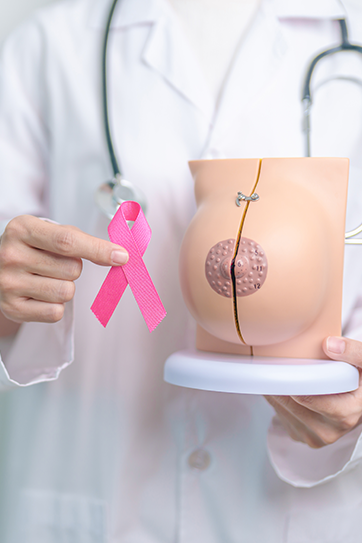Breast cancer is a type of cancer caused by a malignant tumor that develops in the breasts. It is one of the most common types of cancer among women, but it can also occur in men, although rarely.
Breast cancer is usually caused by uncontrolled growth and proliferation of cells in the breast tissue. Breast cancer includes many different types and can be classified according to histopathological features. The most common type is a type called ductal carcinoma, which starts in the milk-producing ducts of the breasts. Lobular carcinoma begins in the lobules of the mammary glands. Breast cancer is usually recognized by the first symptoms felt as a nodule or mass, but it can also cause changes in the breast skin, nipple or around the breast.
Breast cancer is a heterogeneous cancer group that includes many different types. Types of breast cancer are usually classified according to histopathological features and the origin of the cells. Here are the most common types of breast cancer seen in the community:
Ductal Carcinoma: It is the most common type of breast cancer and starts in the breast ducts. In ductal carcinoma in situ (DCIS) the cells are confined to the duct walls and in invasive ductal carcinoma (IDC) the cells can spread to surrounding tissues.
Lobular Carcinoma: This type, which starts in the lobules of the mammary glands, is divided into two main categories, invasive lobular carcinoma and lobular carcinoma in situ (LCIS). LCIS is usually a precancerous condition, but invasive lobular carcinoma is a more aggressive type.
Inflammatory Breast Cancer (IBC): This type is a rare form that usually causes symptoms such as redness of the breast skin, swelling, and increased temperature. IBC can spread faster than other types.
Triple-Negative Breast Cancer: This type refers to the type of breast cancer that is estrogen receptor (ER), progesterone receptor (PR), and HER2 (human epidermal growth factor receptor 2) negative. This type of cancer may not respond to hormonal and targeted therapies.
HER2 Positive Breast Cancer: This type, which has excessive activity in the HER2 gene, can stimulate cell growth. This means that HER2-positive breast cancer may require a specialized treatment approach.
The factors that cause breast cancer to occur are complex and diverse. Many genetic, hormonal, environmental, and lifestyle factors can play a role in the development of this type of cancer. Genetic factors are closely associated with breast cancer risk. In particular, mutations in genes such as BRCA1 and BRCA2 can increase the likelihood of developing this type of cancer. Genetic tests may also be recommended for people with a family history of breast or ovarian cancer.
Hormonal imbalances are also a factor affecting the development of breast cancer. Conditions such as starting menstruation early, entering menopause late, not giving birth, and using hormone-containing drugs may cause hormonal changes and consequently increase the risk of breast cancer.
On the other hand, age is another important factor that increases the risk of breast cancer. Especially women over the age of 50 are at a higher risk compared to younger ages. However, breast cancer can also occur at a young age. Women are at a higher risk of breast cancer compared to men. Individuals who have had breast cancer before are at risk of recurrence. Therefore, regular follow-up and control after treatment is important.
In addition, radiotherapy applied to the breast area may increase the risk of breast cancer, especially when performed at a young age. Obesity and lack of regular exercise are also among the factors affecting the risk of breast cancer. Exposure to chemicals, hormone-containing products, or environmental pollutants may also increase the risk of breast cancer, but research on this subject has not yet reached a clear conclusion.
In cases requiring surgical intervention, breast cancer surgeries include various methods that may vary depending on the stage and type of the disease and the general health status of the patient. Generally, the type of surgery is determined by considering the size of the tumor, its spread, and its effect on the lymph nodes. A lumpectomy is a surgical procedure that involves the removal of the tumor and a small piece of surrounding tissue in individuals with breast cancer. This procedure targets only the tumor area, preserving some of the breast tissue. Lumpectomy is usually preferred in the treatment of small tumors and early-stage breast cancers.
Mastectomy is a surgical procedure that involves the removal of the entire breast in the treatment of breast cancer. In this procedure, breast tissue, areola, and sometimes skin may also be removed. Mastectomy is usually performed for large tumors, multiple tumors, or if breast-conserving surgery is not possible. In a sentinel lymph node biopsy procedure, a lymph node is identified using a special radioactive substance or dye to determine the spread of the tumor to the lymph nodes. This lymph node represents the node where the cancer cells first spread. This procedure does not necessarily mean removal of the lymph nodes.
If cancer cells are found in the sentinel lymph node biopsy or the risk is high, more lymph nodes may need to be removed. This procedure involves removing the lymph nodes to determine the spread of the tumor and to remove the cancer cells. Breast reconstruction after mastectomy can be done to restore the appearance of the breast. This can involve a variety of techniques, such as the use of implants or the use of the patient's tissues. Reconstructive surgery can often be planned as a separate stage. For more information, please contact Medwide.




Get practical information about the topics you are most curious about. Everything you need to make informed decisions on your beauty and health journey is here with all the details from A to Z.
Yes, breast cancer is a serious disease and can be life-threatening if left untreated or diagnosed late. However, with early diagnosis and effective treatment, many patients can recover completely.
Breast cancer usually first starts in the breast tissue. However, in later stages, cancer cells can spread to lymph nodes or more distant organs. This is called metastasis. The most common sites of metastasis in breast cancer are the bones, liver, lungs, and brain.
When breast cancer is left untreated, the patient's life expectancy can be significantly reduced. However, this depends on many factors, such as the type and stage of cancer, the general health of the patient and the response to treatment. With early detection and appropriate treatment, many patients can recover successfully, but each patient is different and the prognosis is individual.
Medwide meticulously arranges airport transfers for patients and their companions, ensuring their comfort and satisfaction.
Medwide's VIP transfer service offers patients a personalized and privileged travel experience, providing exceptional service.
Medwide transports patients and their companions comfortably and luxuriously, making their journeys enjoyable and relaxing.
Medwide offers quality healthcare services to patients at affordable prices, ensuring transparency and fairness in costs.
Medwide provides fast treatments by reducing patient wait times, our expert doctors promptly respond to our patients' needs.